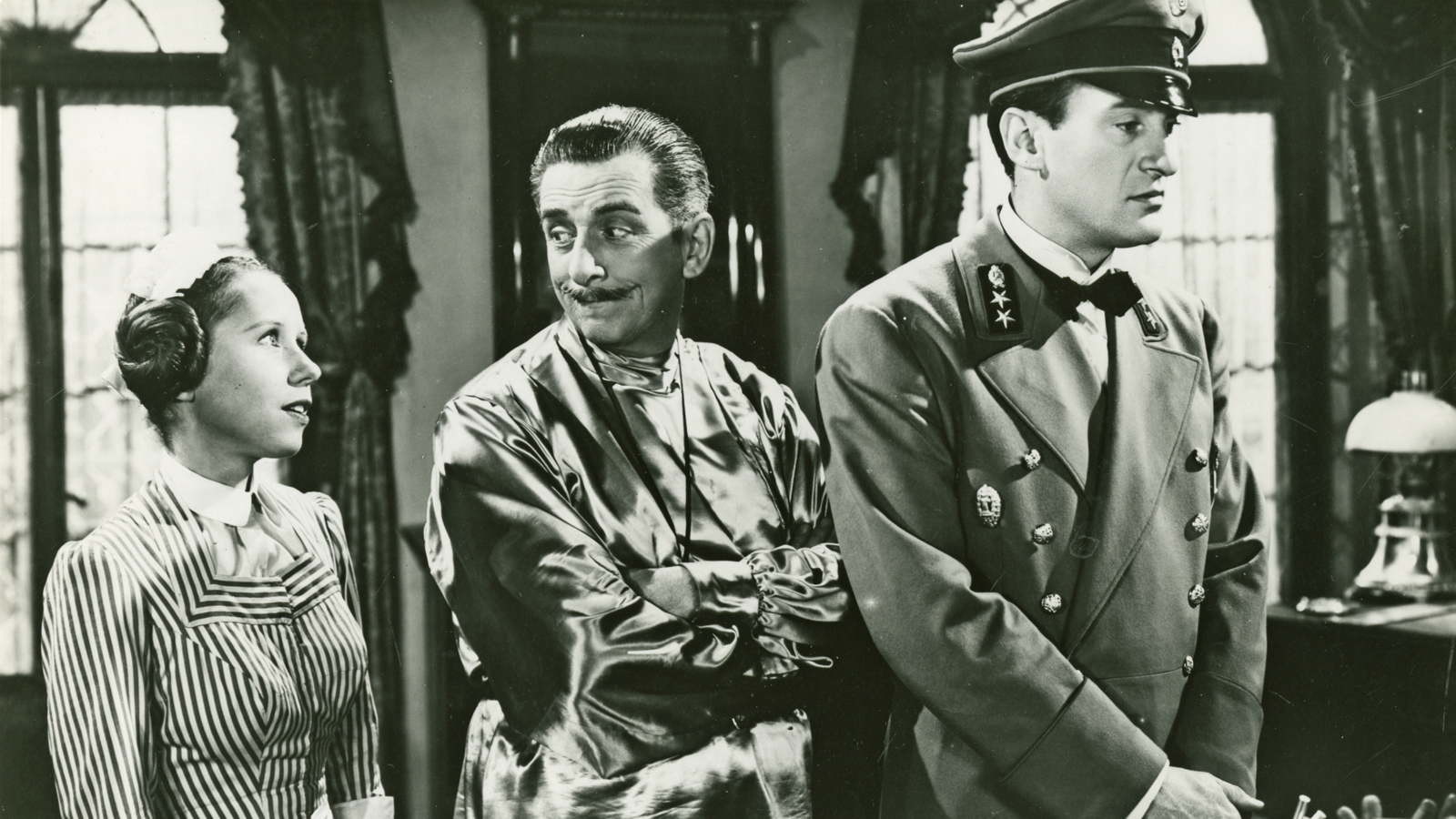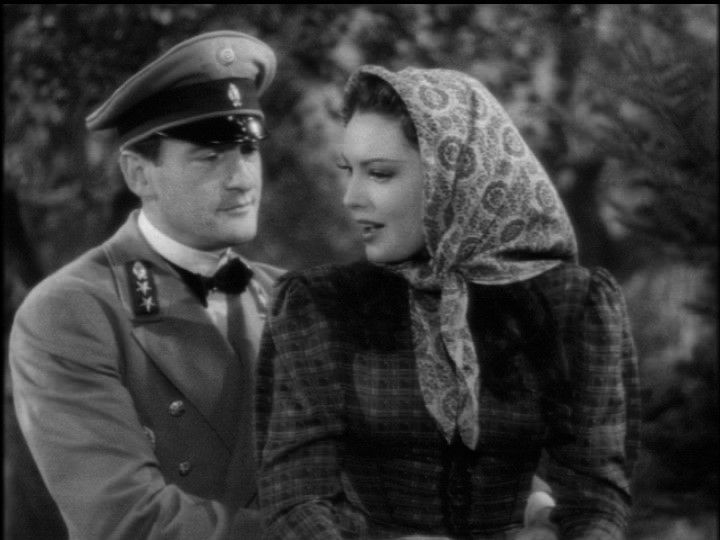Até mesmo grandes diretores começaram dando pequenos passos. Hoje nosso foco é um filme de Douglas Sirk feito para os estúdios Angelus Pictures e Nero Film, ambos praticamente esquecidos na atualidade. Nero Film, assim como Sirk, tinha como casa a Alemanha e migrou quando os nazistas chegaram ao poder. “O que Matou por Amor” é apenas o segundo filme de Sirk feito em Hollywood, e um filme que ecoa as raízes europeias do diretor.
Even big directors started small. Today we showcase a
film by Douglas Sirk made for the studio Angelus Pictures, as well as Nero
Film, both nearly forgotten today. Nero Film, just like Sirk, was based in
Germany and fled as Nazis came to power. “Summer Storm” is just Sirk’s second
film made in Hollywood, and one that echoed his European roots.
Our story starts in 1919, in revolutionary Russia,
when the former Count Volsky (Edward Everett Horton) seeks a newspaper to
publish a story. He arrives at the local Times headquarters and learns that the
new editor is an old acquaintance, Nadena Kalenin (Anna Lee). He then hands her
the manuscript and we’re immersed in the story.
Cut to 1912, in pre-revolutionary Russia. Nadena has
just gotten engaged to Fedor ‘Fedya’ Petroff (George Sanders), but he meets an
enchanting peasant, Olga (Linda Darnell), at Volsky’s place. Olga marries one
of Volsky’s employees, Anton Urbenin (Hugo Haas), but she’s clearly disgusted
by her husband and pursues Fedya instead. Not satisfied, she also seduces
Volsky!
When Fedya and Olga first kiss, she’s more worried about her only pair of boots, that she was holding and fall from her hand. In their second kiss – or in the second kiss we see – it’s her wedding day and suddenly she’s more secure and bold. This transition from simple girl to a kind of femme fatale seems odd, but makes sense as Olga is a woman hardened by her reality: with an alcoholic father, her only way out of a miserable life is through her relationships with men.
Linda Darnell tinha apenas 20 anos quando fez “O
que Matou por Amor”. Nascida Monetta Eloyse Darnell em Dallas, Texas, ela foi
obrigada pela mãe a começar uma carreira como modelo aos 11 anos de idade e
como atriz aos 13. Ela fez seu primeiro filme em 1939 e vinha interpretando personagens
inocentes... até “O que Matou por Amor”. Este filme mudou sua imagem junto ao
público e a partir daí ela passou a interpretar personagens mais ambíguas,
incluindo algumas femme fatales, com grande sucesso.
Linda Darnell was only 20 when she made “Summer Storm”. Born
Monetta Eloyse Darnell in Dallas, Texas, she was pushed by her mother to pursue
a modeling career, that started at age 11, and an acting career, starting at
13. She made her first film in 1939 and had been playing innocent characters… until
“Summer Storm”. This film changed her public image and from then on she played
more ambiguous characters, including a few femme fatales, with great success.
Count Volsky’s young maid Clara (Laurie Lane) swoons when she says Fedya is there to see his friend. She had reason: George Sanders was one of the most charming actors from Old Hollywood. With a distinct, melodic voice, Sanders was chosen for the role because he looked like German actor Willy Birgel, who was Sirk’s first choice when the director was developing the adaptation of the novel still in Germany. Sirk left the country in 1937, but kept his idea of adapting “The Shooting Party” to the screen.
“O que Matou por Amor” é baseado num romance do
notório escritor russo Anton Chekhov, e o texto foi adaptado para as telas por
Douglas Sirk e Michael O’Hara. Mas não existia ninguém chamado Michael O’Hara:
é apenas o pseudônimo de Sirk! O roteiro final é creditado a Rowland Leigh, mas
ele não foi a primeira escolha de Sirk: o primeiro roteirista contratado, James
M. Cain, foi demitido por Sirk porque ele fez os personagens parecerem “americanos
demais”. “The Shooting Party” foi o trabalho mais longo de Chekhov e seu único
romance.
“Summer Storm” is based on a novel by the notorious Russian
writer Anton Chekhov, and the text was adapted to the screen by Douglas Sirk
and Michael O’Hara. But there was no such person named Michael O’Hara: it’s
only Sirk’s pseudonym! The final screenplay is credited to Rowland Leigh, but
he wasn’t Sirk’s first choice: the first screenwriter hired, James M. Cain, was
fired by Sirk because he made the characters seem “too American”. “The Shooting
Party” was Chekhov’s largest work and only full-length novel.
Feito numa época em que ainda não havia
animosidade em relação à Rússia e União Soviética – o país e os EUA eram aliados
durante a Segunda Guerra Mundial, e a Guerra Fria ainda levaria um par de anos
para começar – “O que Matou por Amor” bebe da tradição russa e nos faz imaginar
que obras-primas poderiam vir se Hollywood tivesse continuado adaptando obras
russas. Um veículo excelente para suas estrelas, este é certamente um filme que
vale a pena ser visto se ainda não foi.
Made in a time when there wasn’t yet animosity regarding
Russia and URSS – the country and the USA were allies during World War II, and
the Cold War would still take a couple of years to start – “Summer Storm”
drinks from Russian tradition and makes us wonder which masterpieces would come
if Hollywood kept adapting Russian works. An excellent vehicle for its stars,
it is surely a film to check out if you haven’t yet.
This is my contribution to the Linda Darnell Centennial blogathon, hosted by Samantha at Musings of a Classic Film Addict.





3 comments:
Linda Darnell and George Sanders directed by Douglas Sirk? I had no idea this existed before now and it sounds amazing! Thank you so much for convincing me so easily to watch it and for your wonderful review and participation in the blogathon!
I saw this for the first time earlier this year and I don't know why, but I wasn't that wild about it. I loved Linda in it, though (as usual!) -- and I also shared it with my mom and she really enjoyed the movie. I really enjoyed your write-up, Le -- maybe I'll give it another try!
-- Karen
Great review! It would be interesting to see how much of Chekhov's original words made it into the final product. I can't imagine Cain working on a script like this--you would think he'd also make things too racy.
Post a Comment